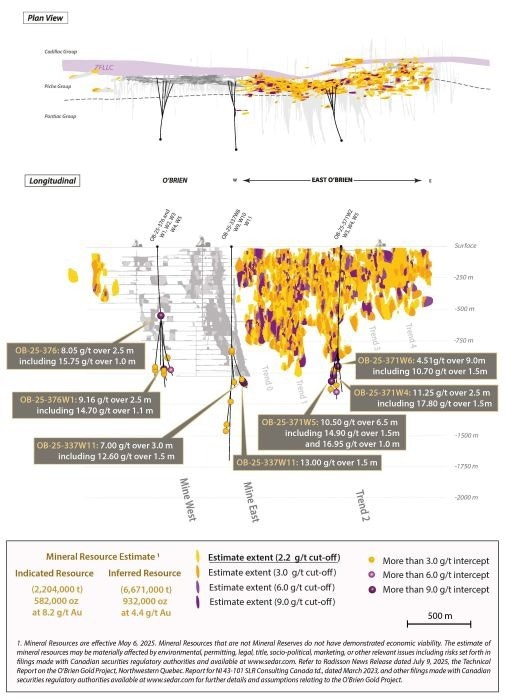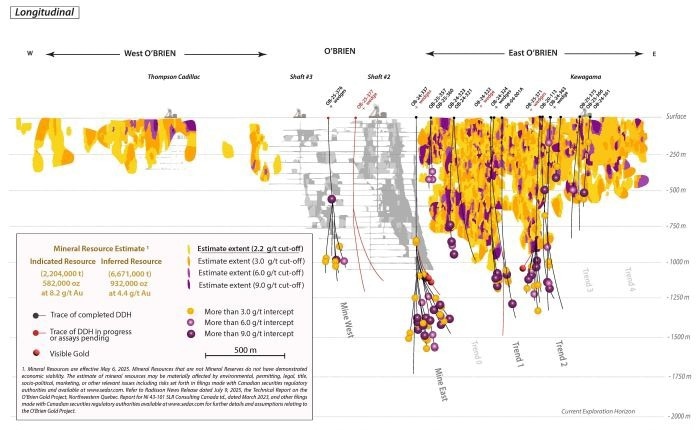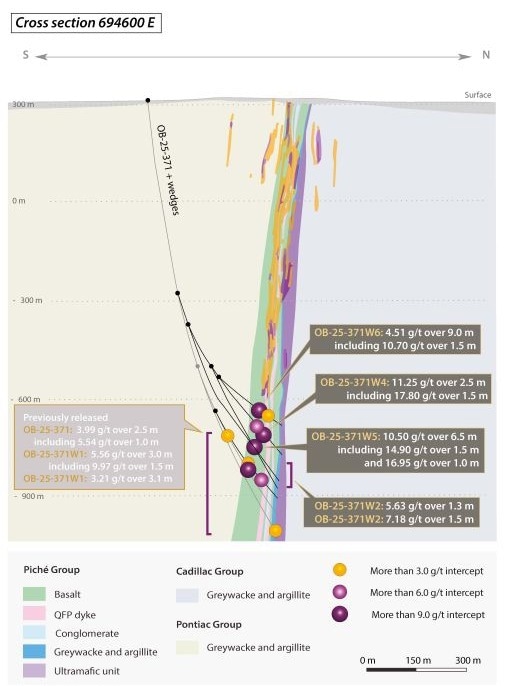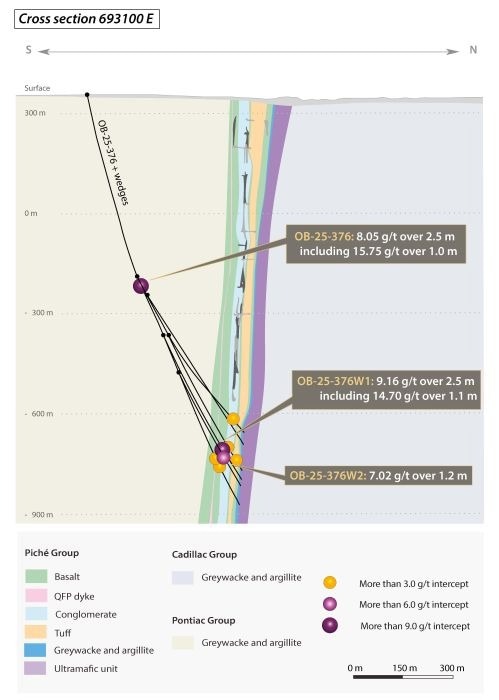Radisson Mining Resources Inc. ("Radisson") is pleased to announce assay results from fifteen new drill holes completed at its 100 %-owned O'Brien Gold Project ("O'Brien") located in the Abitibi region of Québec. The fifteen holes represent step-outs below the existing geological model and the historic O'Brien Gold Mine and are part of an ongoing 140,000-meter drill program designed to test the overall scope of gold mineralization at the Project (see Radisson news release dated October 16, 2025). All holes intersected gold mineralization in characteristic quartz-sulphide-gold veins within alteration zones, and thirteen of the holes returned intercepts with grades and thicknesses consistent with the Project's existing mineral resources.
 Figure 1. Longitudinal Vertical Section and Plan View of Gold Vein Mineralization and Mineral Resources at the O'Brien Gold Project, with Today's Drill Holes Illustrated. Image Credit: Radisson Mining Resources Inc.
Figure 1. Longitudinal Vertical Section and Plan View of Gold Vein Mineralization and Mineral Resources at the O'Brien Gold Project, with Today's Drill Holes Illustrated. Image Credit: Radisson Mining Resources Inc.
Today's results include significant intercepts in three separate step-out locations (Figures 1 & 2), each of which has significance for the potential future growth of the Project's mineral resources. These are:
Between Trends #1 and #2 at 1,000 Meters Vertical Depth
- OB-25-371W5 intersected 10.50 grams per tonne ("g/t") gold ("Au") over 6.5 meters, including 14.90 g/t Au over 1.5 meters and including 16.95 g/t Au over 1.0 meter
- OB-25-371W4 intersected 11.25 g/t Au over 2.5 meters, including 17.80 g/t Au over 1.5 meters
- OB-25-371W6 intersected 4.51 g/t Au over 9.0 meters, including 10.70 g/t Au over 1.5 meters
Beneath the Historic "O'Brien Mine West" at 1,000 Meters Vertical Depth
- OB-25-376W1 intersected 9.16 g/t Au over 2.5 meters, including 14.70 g/t Au over 1.1 meters
- OB-25-376 intersected 8.05 g/t Au over 2.50 meters, including 15.75 g/t Au over 1.0 meter
Beneath the Historic "O'Brien Mine" at 1,100 Meters Vertical Depth
- OB-24-337W11 intersected 7.00 g/t Au over 3.0 meters, including 12.60 g/t Au over 1.5 meters, and 13.00 g/t Au over 1.50 meters
Matt Manson, President & CEO, commented: "Today's drill results illustrate the extension of classic, high-grade O'Brien gold mineralization across a broad front. We are reporting the first high-grade intercepts beneath the western portion of the historic mine, with drill hole OB-25-376W1 extending mineralization 160 meters below the former mine in this area. Drill hole OB-24-337W11 demonstrates continuity of high-grade mineralization below the main stope of the historic mine. Of particular note, drill holes OB-25-371W4 to W6 returned high-grade mineralization on the western edge of the deep extension of Trend #2, close to the observed extension of Trend #1 (Figures 1&2). This suggests that the apparent gap between these two trends is a function of drill coverage rather than geology, as we have suspected. Closing this gap with new drilling is a priority. With a fully-funded 140,000-meter drill program ongoing and an increase in rigs from the current four to an eventual eight, we are casting a wide net at O'Brien and seeing consistent success."
Notes on Calculation of Drill Intercepts:
The O'Brien Gold Project Mineral Resource Estimate effective May 6, 2025 ("MRE") utilizes a 2.20 g/t Au bottom cut-off, a US$2,000 gold price, a minimum mining width of 1.2 meters, and a 40 g/t Au upper cap on composites. Intercepts presented in Table 1 are calculated with a 3.00 g/t Au bottom cut-off. True widths, based on depth of intercept and drill hole inclination, are estimated to be 30-80 % of core length. Table 2 presents additional drill intercepts calculated with a 1.00 g/t bottom cut-off over a minimum 1.0 meter core length so as to illustrate the frequency and continuity of mineralized intervals within which high-grade gold veins at O'Brien are developed. Lithology Codes: PON-S3: Pontiac Sediments; V3-S, V3-N, V3-CEN: Basalt-South, North, Central; S1P, S3P: Conglomerate; POR-S, POR-N: Porphyry South, North; TX: Crystal Tuff; ZFLLC: Larder Lake-Cadillac Fault Zone.

Figure 2. Longitudinal Vertical Section of Gold Vein Mineralization and Mineral Resources at the O'Brien Gold Project, with Deep Step-Out Drill Holes Completed and/or Published by the Company since December 2024. Image Credit: Radisson Mining Resources Inc.
Gold Mineralization at O'Brien
Gold mineralizing quartz-sulphide veins at O'Brien occur within a thin band of interlayered mafic volcanic rocks, conglomerates, and porphyritic andesitic sills of the Piché Group occurring in contact with the east-west oriented Larder Lake-Cadillac Break ("LLCB"). Gold, along with pyrite and arsenopyrite, is typically associated with shearing and a pervasive biotite alteration, and developed within multiple Piché Group lithologies and, occasionally, the hanging-wall Pontiac and footwall Cadillac meta-sedimentary rocks.
As mapped at the historic O'Brien mine, and now replicated in the modern drilling, individual veins are generally narrow, ranging from several centimeters up to several meters in thickness. Multiple veins occur sub-parallel to each other, as well as sub-parallel to the Piché lithologies and the LLCB. Individual veins have well-established lateral continuity, with near-vertical, high-grade shoots developed over significant lengths. Based on the historic data available, it is clear that the former mine was "high-graded", with mining focussed on a main central stope and parallel veins identified but left undeveloped.
The historic O'Brien mine produced over half a million ounces of gold from such veins and shoots at an average grade exceeding 15 g/t Au and over a vertical extent of at least 1,000 meters. Modern exploration has focussed on delineating well developed vein mineralization to the east of the historic mine, with additional high-grade shoots becoming evident in the exploration data over what has been described as a series of repeating trends ("Trend #s 0 to 5").
Step-Out Drilling at O'Brien
Since the end of 2024, Radisson has been pursuing a program of broad step-outs beneath the historic O'Brien Gold mine and the existing mineral resources designed to test the extent of mineralization at the Project. This drilling is accomplished with pilot holes followed by wedges and directional drilling to maximize drill efficiency. On October 16, 2025 Radisson announced the expansion of the step-out drill program to 140,000 meters employing an eventual eight drill rigs.
The origin of the step-out drill program was the deep pilot hole OB-24-337, which was the first exploration drill hole located below the former mine workings since mining ended in 1957. This hole intersected 31.24 g/t Au over 8.0 meters, including 242.0 g/t Au over 1.0 meter at approximately 1,500 meters vertical depth (see Radisson news release dated December 16, 2024). With today's results, assay results from a total of 11 wedges from OB-24-337 have now been reported and up to six gold-bearing veins have been delineated over an area of approximately 250 meters (east-west) by 500 meters (vertical). Included in today's results is the eleventh wedge, OB24-337-W11, which intersected 7.00 g/t Au over 3.0 meters, including 12.60 g/t Au over 1.5 meters, and 13.00 g/t Au over 1.50 meters approximately 100 meters below the final historic mining stope (Figure 1). This serves to demonstrate the continuity of mineralization from the former mine downwards towards the cluster previously published wedges (Figures 1 & 2; see Radisson news release dated July 16, 2025). Current drilling in this area is focussed on infilling with pilot holes and wedge extensions both above and below the OB-24-337 pattern of wedge branches to test the full continuity of mineralization from the historic mine down to 2 kilometers depth.
Step-out drilling with wedge branches has also confirmed high-grade mineralization 170 meters below the base of the existing mineral resources at Trend #1 and 300 meters at Trend #2. These have included pilot hole OB-24-324, which intersected 27.61 g/t Au over 6.0 meters at Trend #1 (see Radisson news release dated October 30, 2024) and OB-24-363, which intersected 8.41 g/t Au over 2.20 meters, including 14.40 g/t Au over 1.20 meters and 9.07 g/t Au over 1.80 meters, including 12.10 g/t Au over 0.90 meters at Trend #2 (see Radisson news release dated September 8, 2025). Today's results include six wedges from drill hole OB-25-371, which demonstrate strongly developed, high-grade mineralization on the western edge of the deep extension of Trend #2. These holes include OB-25-371W5, which intersected 10.50 g/t Au over 6.5 meters, including 14.90 g/t Au over 1.5 meters and including 16.95 g/t Au over 1.0 meter (Figures 1&3). The significance of these holes is that the apparent separation of Trend #1 and Trend #2 is based, in part, on a data gap caused by drill rig access restrictions and a lack of drilling (Figure 2). Targeting this gap and testing for continuity of mineralization between Trends #1 and #2, as well as at depth, is a priority of the current drill program.
Today's results also include the first drill holes located below the western portion of the historic O'Brien Gold Mine, designated "O'Brien Mine West". As with the main mining area, no exploration had been conducted below O'Brien Mine West since operations ended in 1957. From pilot hole OB-25-376 and wedge branches W1 to W5, five holes returned intercepts with grades and thicknesses consistent with the Project's mineral resources, including OB-25-376W1, which intersected 9.16 g/t Au over 2.5 meters, including 14.70 g/t Au over 1.1 meters (Figure 1). This now extends gold mineralization at O'Brien Mine West 160 meters below the base of the former mine workings (Figure 4).

Figure 3. Vertical Cross Section through "Trend #2" with Drill Hole Wedges OB-25-371W2 to W6. Image Credit: Radisson Mining Resources Inc.

Figure 4. Vertical Cross Section through "O'Brien Mine West" with Drill Hole OB-25-376 and Wedges W1 to W5. Image Credit: Radisson Mining Resources Inc.
QA/QC
All drill cores in this campaign are NQ in size. Assays were completed on sawn half-cores, with the second half kept for future reference. The samples were analyzed using standard fire assay procedures with Atomic Absorption (AA) finish at ALS Laboratory Ltd, in Val-d'Or, Quebec. Samples yielding a grade higher than 10 g/t Au were analyzed a second time by fire assay with gravimetric finish at the same laboratory. Mineralized zones containing visible gold were analyzed with metallic sieve procedure. Standard reference materials, blank samples and duplicates were inserted prior to shipment for quality assurance and quality control (QA/QC) program.
Qualified Persons
Disclosure of a scientific or technical nature in this news release was prepared under the supervision of Mr. Richard Nieminen, P.Geo, (QC), a geological consultant for Radisson and a Qualified Person for purposes of NI 43-101. Mr. Luke Evans, M.Sc., P.Eng., ing, of SLR Consulting (Canada) Ltd., is the Qualified Person responsible for the preparation of the MRE at O'Brien. Each of Mr. Nieminen and Mr. Evans is independent of Radisson and the O'Brien Gold Project.